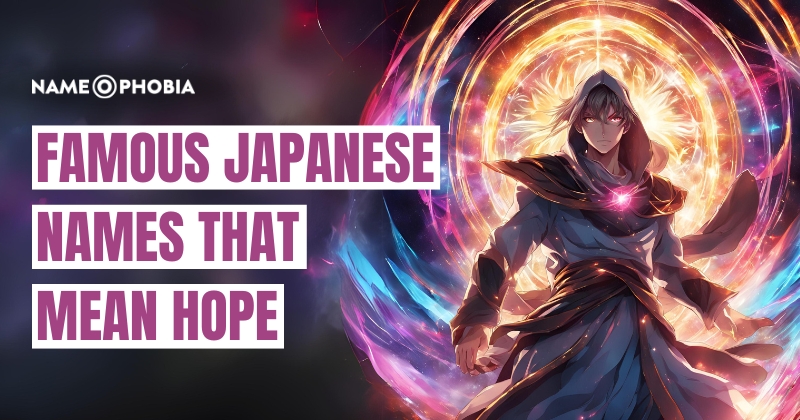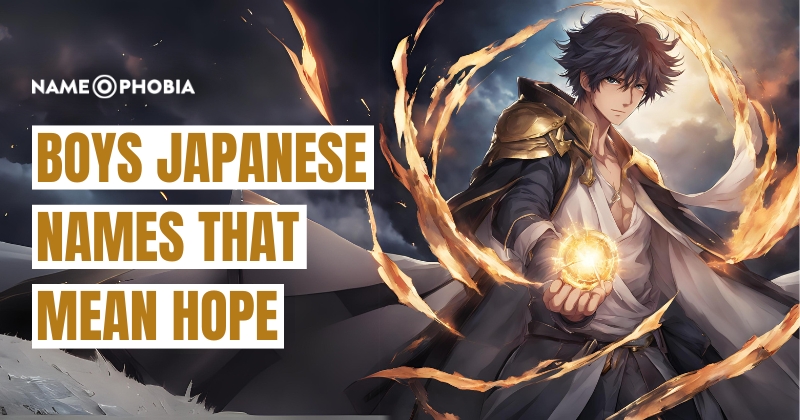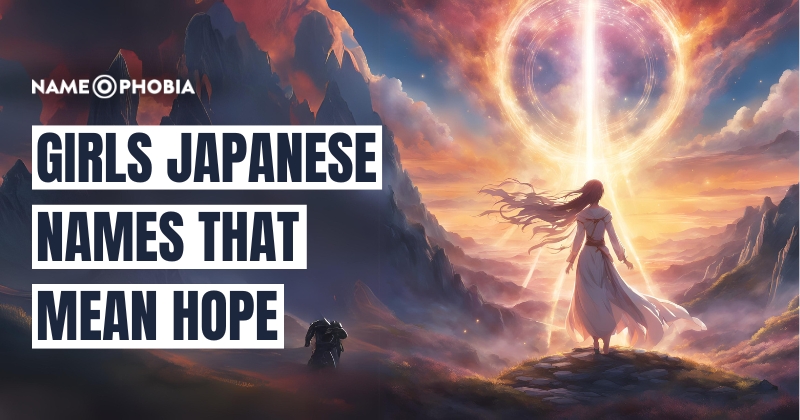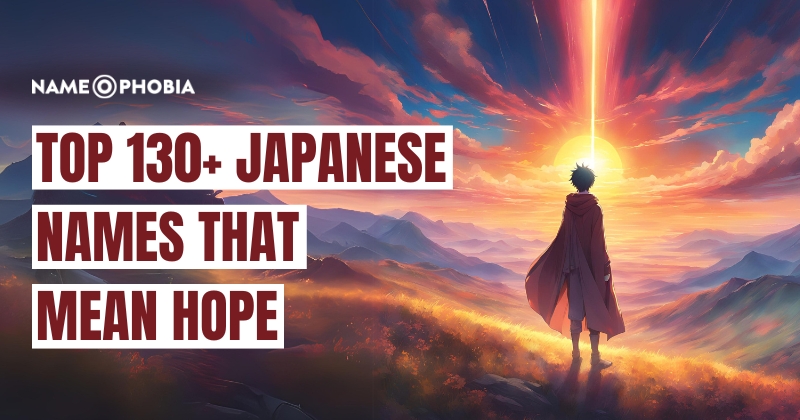When you’re picking a name, it’s nice to choose something with a positive meaning, and hope is one of the best.
In Japanese culture, names often carry special meanings, and Japanese names that mean hope are a beautiful option.
Whether you’re naming a baby, a character, or even a pet, names that mean hope bring a sense of positivity and belief in the future.
They remind us that there’s always something good to look forward to, even in tough times.
In this article, we’ll look at some lovely Japanese names that mean hope.
If you’re looking for a name that’s full of optimism, these Japanese names that mean hope might be just what you need.
Let’s explore together!
Famous Japanese Names That Mean Hope

Famous Japanese Names That Mean Hope showcases simple and meaningful Japanese names that stand for hope, representing positivity and new beginnings in Japanese culture.
- Kibou (希望): Hope; embodies optimism and belief in a brighter future.
- Nozomi (望): Hope, wish; signifies deep aspirations and desires for what’s to come.
- Yume (夢): Dream; represents visions that inspire the pursuit of goals.
- Asa (朝): Morning, new beginning; symbolizes renewal and the potential of each day.
- Haruka (遥): Distant hope; conveys longing for aspirations that seem far away.
- Hikari (光): Light, hope; symbolizes guidance and the brightness hope brings.
- Hinata (陽向): Sunny place; embodies warmth and positivity in life.
- Akira (明): Bright hope; represents clarity and optimism that inspires others.
- Aimi (愛美): Love, beauty; signifies the blend of affection and aesthetics.
- Koharu (小春): Late summer; symbolizes serene moments of joy and comfort.
- Saki (咲): Bloom, growth; conveys the beauty of flourishing and reaching potential.
- Rin (凛): Strong, dignified; embodies elegance and integrity.
- Mitsuki (美月): Beautiful moon; symbolizes calmness and serenity.
- Mio (澪): Waterway, path; represents a purposeful journey through life.
- Yua (結愛): Binding love; embodies deep connections and relationships.
- Tsubasa (翼): Wings, freedom; symbolizes the ability to soar and explore.
- Aina (愛菜): Love, care; signifies nurturing affection and compassion.
- Kazumi (一美): Harmonious beauty; represents balance and grace in life.
- Aya (彩): Color, vibrancy; symbolizes the richness of life and brightness.
- Natsuki (夏希): Summer hope; signifies warmth and uplifting feelings.
- Miyuki (美雪): Beautiful snow; symbolizes purity and tranquility.
- Mei (芽衣): Bud, sprout; embodies growth and new beginnings.
- Kanon (花音): Flower sound; signifies beauty and harmony in life.
- Himari (陽葵): Sunflower; symbolizes warmth and a bright personality.
- Aoi (葵): Hollyhock; embodies strength and resilience.
- Sakura (桜): Cherry blossom; symbolizes fleeting beauty and renewal.
- Rei (怜): Wise, hopeful; embodies intelligence combined with optimism.
- Mirai (未来): Future; signifies potential and hope for what lies ahead.
- Nanami (七海): Seven seas; symbolizes adventure and exploration.
- Shiori (栞): Guide, journey hope; represents direction and encouragement toward aspirations.
Also Check : Japanese Names Meaning Dark
Boys Japanese Names That Mean Hope

Boys Japanese Names That Mean Hope are names that represent positivity and a bright future, making them great choices for parents who want to inspire their children with a sense of optimism.
- Akihiko (明彦): Bright prince; symbolizes enlightenment and nobility.
- Masato (正人): Righteous person; represents integrity and moral strength.
- Harunobu (春信): Spring trust; embodies renewal and hope in new beginnings.
- Keitaro (慶太郎): Celebratory son; signifies joy and festivity in life.
- Shouma (翔真): True flight; conveys genuine freedom and aspiration.
- Rikuto (陸斗): Land and effort; symbolizes hard work and determination.
- Hiroyuki (弘幸): Prosperous happiness; embodies expansive joy and success.
- Takayuki (高幸): High happiness; represents profound fulfillment and joy.
- Masaki (雅樹): Elegant tree; signifies strength and grace.
- Noboru (昇): To rise; symbolizes progress and ascension.
- Takeshi (武): Warrior; embodies courage and strength.
- Kazuma (一真): One true hope; represents singular purpose and inspiration.
- Rei (礼): Gratitude; signifies appreciation and respect for others.
- Hoshin (星仁): Star benevolence; symbolizes kindness and guidance.
- Shinji (信二): True belief; embodies strong convictions and faith.
- Tatsuki (達樹): Accomplished tree; signifies achievement and support.
- Hikaru (光): Radiance; symbolizes brightness and positivity.
- Keisuke (圭介): Auspicious help; represents beneficial support.
- Masahiro (雅宏): Elegant and wide; embodies refinement and grandeur.
- Shouji (翔司): Soaring rule; symbolizes elevated leadership.
- Kouhei (康平): Peaceful health; signifies tranquility and well-being.
- Yuuto (優斗): Gentle big; represents kindness and strength.
- Souta (蒼太): Blue and thick; symbolizes depth and stability.
- Haruki (春樹): Spring tree; embodies growth and renewal.
- Yuuki (雄樹): Brave tree; signifies courage and resilience.
- Renji (連次): Connected next; represents continuity in relationships.
- Satoshi (聡): Intelligent; symbolizes wisdom and insight.
- Takumi (匠): Artisan; represents skill and craftsmanship.
- Kazuto (一斗): One big hope; signifies singular vision and aspiration.
- Yoshitaka (良隆): Good and prosperous; embodies positive change.
- Kiyoshi (清志): Pure wish; symbolizes clarity of intention.
- Haruto (陽翔): Sunlight flight; represents optimism and freedom.
- Ryusei (流星): Flowing star; signifies brilliance and impact.
- Junpei (純平): Pure peace; embodies calmness and harmony.
- Hideto (秀人): Excellent person; symbolizes capability and excellence.
- Kenta (健太): Healthy big; represents vitality and strength.
- Natsuhiro (夏広): Summer expanse; signifies warmth and growth.
- Haruto (春人): Spring person; embodies renewal and vibrancy.
- Reito (零斗): Fresh beginnings; symbolizes new opportunities.
- Koutarou (幸太郎): Fortunate son; represents luck and happiness.
- Rikuya (陸也): Land being; signifies groundedness and stability.
- Hayato (隼人): Falcon person; symbolizes speed and determination.
- Shouta (翔太): Soaring big; embodies ambition and aspiration.
- Chikara (力): Power; represents strength and influence.
- Yoshio (義雄): Righteous hero; symbolizes bravery and integrity.
- Akihito (明仁): Bright man; embodies wisdom and clarity.
- Daigo (大悟): Great enlightenment; signifies profound understanding.
- Isamu (勇): Brave; represents courage in facing challenges.
- Keiichi (圭一): One auspicious; symbolizes good fortune.
- Masafumi (正文): Righteous writing; signifies honesty and clarity in communication.
Also Check : Japanese Names Meaning Time
Girls Japanese Names That Mean Hope

Explore beautiful girls Japanese names that mean hope, Each name represents positivity and the promise of a bright future.
- Akira (明): Brightness that illuminates the path forward.
- Chika (千佳): A name that suggests a thousand beauties or qualities.
- Emiko (恵美子): A child who embodies blessing and beauty, bringing joy to others.
- Fuyumi (冬美): Beauty of winter, symbolizing resilience and hope during cold times.
- Haruko (春子): Child of spring, representing renewal and new beginnings.
- Kaori (香織): A fragrant weave, symbolizing a life filled with pleasant experiences.
- Kiyoko (清子): A pure child, representing innocence and clarity of purpose.
- Manami (愛美): A blend of love and beauty, suggesting a compassionate spirit.
- Megumi (恵): A name meaning blessing, embodying hope and good fortune.
- Mitsuki (美月): Beautiful moon, symbolizing guidance and serenity.
- Nayuta (奈由太): A name suggesting infinite hope and endless possibilities.
- Rina (里奈): Village greens, symbolizing harmony with nature and community.
- Sachiko (幸子): Child of happiness, representing joy and optimism.
- Sakiko (咲子): Child of blossoms, symbolizing growth and beauty.
- Sayaka (清香): Pure fragrance, suggesting a refreshing and uplifting presence.
- Shizuko (静子): Quiet child, representing calmness and tranquility.
- Tsubaki (椿): Camellia flower, symbolizing beauty and resilience in harsh conditions.
- Uta (詩): Poem, representing the hope and beauty found in expression.
- Yoshiko (佳子): Good child, suggesting kindness and moral integrity.
- Yuna (優奈): Gentle and graceful, embodying elegance and hope.
- Akemi (明美): Bright beauty, representing a vibrant and optimistic spirit.
- Ayumi (歩美): Walking beauty, symbolizing a journey filled with hope.
- Chiyo (千代): Thousand generations, suggesting enduring hope through time.
- Emi (恵美): Blessed beauty, representing a life filled with grace and kindness.
- Fumika (文香): Literary fragrance, symbolizing the beauty of stories and dreams.
- Hanako (花子): Flower child, representing growth, beauty, and vitality.
- Hikari (光): Light, embodying hope and the promise of a brighter future.
- Kayo (佳代): Beautiful generation, suggesting hope for the future through lineage.
- Kurumi (胡桃): Walnut, symbolizing resilience and strength amidst challenges.
- Mako (真子): True child, representing authenticity and a genuine spirit.
- Miki (美紀): Beautiful chronicle, symbolizing a life story filled with hope.
- Nanami (七美): Seven beauties, suggesting abundance and diversity in beauty.
- Riko (理子): Child of logic, representing wisdom and thoughtful hope.
- Sakura (桜): Cherry blossom, symbolizing beauty and the transient nature of life.
- Shiori (詩織): Poetic weave, representing a life filled with creativity and expression.
- Tamako (玉子): Gem child, symbolizing preciousness and the value of life.
- Tina (ティナ): Small and precious, embodying hope in modest forms.
- Yoko (陽子): Sun child, representing warmth, light, and hopefulness.
- Yuuka (優花): Gentle flower, symbolizing kindness and delicate beauty.
- Ami (亜美): Asia’s beauty, representing hope in cultural richness.
- Chizuru (千鶴): Thousand cranes, symbolizing peace and longevity.
- Fujiko (藤子): Wisteria child, embodying grace and beauty in relationships.
- Hanae (花恵): Blossom blessing, symbolizing the joy of growth.
- Kanami (佳奈美): Beautiful and harmonious, representing balance and hope.
- Miyuki (美幸): Beautiful happiness, suggesting a joyful and fulfilling life.
- Natsumi (夏美): Summer beauty, symbolizing warmth and optimism.
- Rinako (凛子): Dignified child, representing strength and hope in character.
- Seira (星羅): Star gathering, symbolizing hope and guidance.
- Tomoko (智子): Wise child, representing thoughtful hope and understanding.
- Yuki (幸輝): Happy radiance, suggesting a bright and hopeful disposition.
Conclusion
To wrap things up, looking into Japanese Names That Mean Hope shows how deeply names can connect to our feelings.
These names carry beautiful meanings and reflect our dreams for a brighter future.
For instance, names like Haruka, which suggests light and distance, or Akira, meaning brightness, truly capture that sense of hope.
Choosing Japanese Names That Mean Hope is a wonderful way to spread positivity in your life and those around you.
So, whether you’re naming a child, a character, or even a pet, think about the power behind Japanese Names That Mean Hope.
They aren’t just names, they symbolize the dreams we cherish.
By picking Japanese Names That Mean Hope, you celebrate the beauty of the Japanese language and embrace a hopeful outlook for the future.
